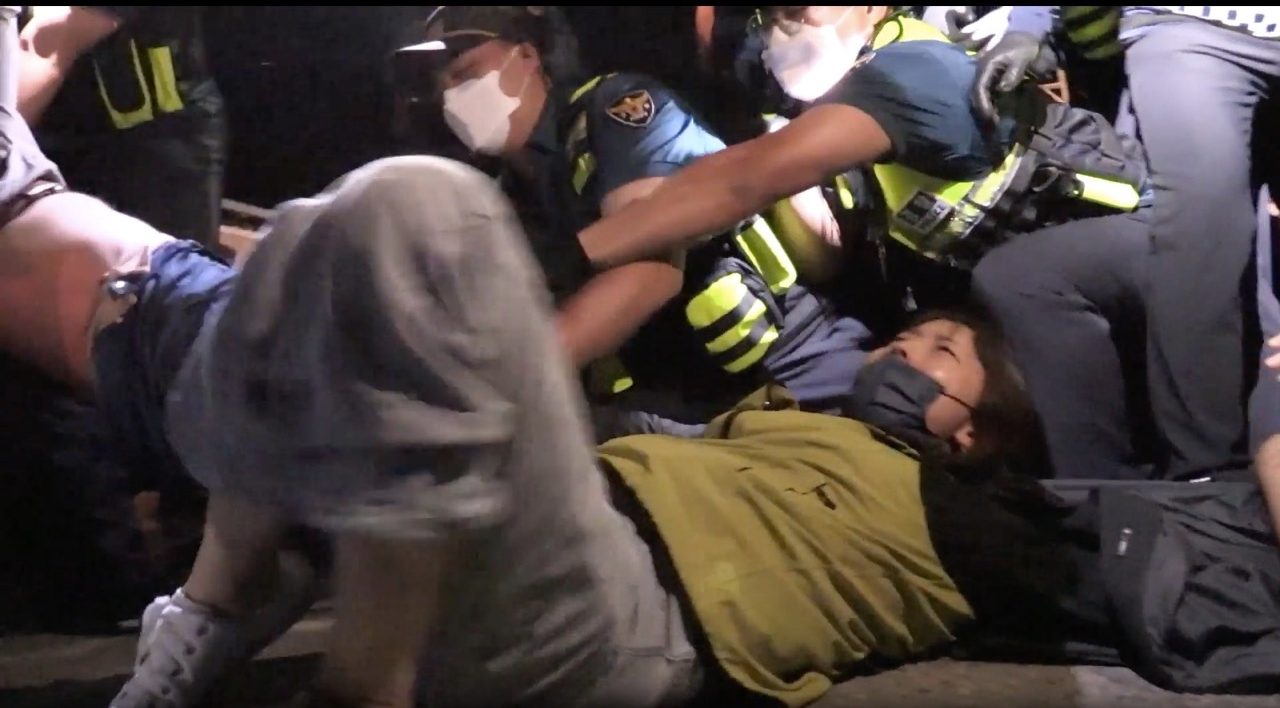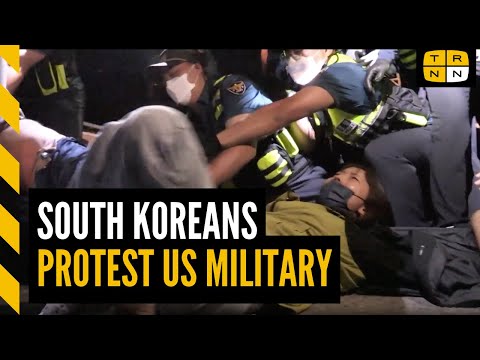Soseong-ri, South Korea, was a sleepy farming village before the arrival of the US military’s Terminal High Altitude Aerial Defense (THAAD) missile system. While the South Korean government and the US military claim that THAAD will protect South Korea from North Korean attacks, activists and experts have long countered that THAAD is incapable of blocking the kinds of short-range missiles North Korea would use against South Korean targets in a hypothetical war. Instead, they charge THAAD’s real purpose is to protect US military assets in nearby Okinawa and Guam. THAAD has also inflamed relations between South Korea and China, which has decried THAAD’s radar system as a way for the US to spy on Chinese military activities. The Real News reports from Soseong-ri, South Korea, where village residents have fought since 2016 against the US military and their own government to stop THAAD.
This story, with the support of the Bertha Foundation, is part of The Real News Network’s Workers of the World series, telling the stories of workers around the globe.
Producer: Dongmin Yang, Son So-hee
Videographer: Dongmin Yang, Son So-hee
Translator: Bori
Video Editor: Leo Erhardt
Transcript
Chants:
“Yankees Go Home!” “Get out Yankees!” “Get out Yankees!”
Narrator:
For the past seven years, the U.S. has been building the Terminal High Altitude Area Defense or THAAD system, in a small town called Soseong-ri, in South Korea. The U.S. military claims that THAAD will protect South Korea from North Korea. But in reality, THAAD is a “high-altitude” missile shield that cannot stop short-range missiles that North Korea could use against targets in South Korea in the event of war.
The real purpose of THAAD is to deter China, and protect U.S. assets in Okinawa and Guam. The building of THAAD is further escalating the risk of war on the Korean Peninsula. Soseong-ri was originally a peaceful village of about 60 residents.
The residents are mainly elderly people in their 70s and 80s. But the peace of Soseong-ri was shattered by the arrival of THAAD.
Chants:
“Never Allow Normalization of Base!” “Dismantle the illegal THAAD!”
Police Officer:
One, two, three!
Protester:
Don’t touch me!
Police Officer:
I got his legs.
Protester:
“Don’t touch our grannies!” “Don’t do it!”
“Hands off!”
No, no, no! You’ll break the chair. Don’t grab it.
Police Officer:
We’re going to take you out.
Protester:
Don’t pick it up. Don’t. Don’t pick it up. Don’t. Don’t pick it up.
Police Officer:
Will you stand up?
Protester:
I’ll stand up later. I will do it myself.
Police Officer:
I won’t touch you,
if you just stand up.
Chants:
“Yankee Go Home!” “Yankee Go Home!”
Narrator:
Residents of Soseong-ri say that the arrival of THAAD put them on the front lines. As a result, they live in constant fear of war.
Gwang-sun Baek – Soseong-ri resident:
Life has changed a lot. Before THAAD, when there’s nothing going on, I would get up and exercise, and our rice paddies are up there, you know, Sohee.
So I would always go back and forth there. I would go there for exercise, not just to work.But ever since THAAD came in, I have to go to a rally every day. There is always an emergency. So I’m always on edge.
Gyu-ran Park – Soseong-ri resident:
50 years. I lived here for exactly 50 years. I got married at 23, and had my oldest daughter at 24.
Interviewer:
(you’re 73 now, so…)
Gyu-ran Park – Soseong-ri resident:
Yes. It’s nice here, simple. We’d get together in the evenings and talk. Going to the village president Yim’s home. We’d go there every evening, before THAAD came. We’d gather there, eating apples and ‘japchae’ (Korean stir-fried glass noodles dish).
Interviewer:
(Why are you so against THAAD?)
Gyu-ran Park – Soseong-ri resident:
It’s right above our heads, and it’s dangerous. It’s not right for THAAD to come to the Korean Peninsula. If it’s so dangerous, why should it come? It shouldn’t. We have a weapon this big above us. It’s right by our bedside, right behind our home. (If it was a good thing, it wouldn’t have come to us.) If it was good, it wouldn’t be here.
Interviewer:
(Why are you so worried about THAAD?)
Gwang-sun Baek – Soseong-ri resident:
I’m worried… We are the ones on the frontline, that’s why we’re worried. Who would be comfortable, living on the front lines? For example, they’re talking about stopping North Korean nukes, but we know that’s not what THAAD is for. I know that, even if I’m an ignorant old bumpkin. So if something were to happen we’d be the first to die. This town is on the front.
Interviewer:
Would you feel comfortable living on the forefront?
Gwang-sun Baek – Soseong-ri resident:
I’m not. That’s why we’re so anxious and nervous.
Chants:
“Stop occupying Soseong-ri!” “No THAAD! Yes Peace!” “Who makes war? USA!”
Narrator:
For the past seven years, residents of Soseong-ri have held weekly protests against the construction of the THAAD base. Gathering in front of the village hall, they have been protesting to stop fuel trucks, US military buses, and construction materials from being brought to the site. South Korean police blocked the residents of Soseong-ri so that the U.S. military could proceed with the construction of the THAAD base. The residents of Soseong-ri
are physically unable to overcome the overwhelming police force. But that hasn’t stopped them from protesting.
Chants:
“Police violence back off!”
Protester:
Hold the waist. My shoulder hurts! Aghh!
Police Officer:
Come on, ma’am, please stand up. Ma’am, stand up. Ma’am, stand up. Come on, ma’am, stand up. Ma’am, stand up.
Protester:
Should I stand up just because you tell me to? We can’t even speak up for our rights.
What are you doing?
Police Officer:
I get that, but…
Protester:
We’re like, what? If the officer orders us to stand up, we stand up, if he says leave, we leave, if he says eat, we eat?
Where do we find our sovereignty?
Where’s our sovereignty?
Police Officer:
Well, ma’am, we’re sorry. We understand that, but we also have our roles as the police. I’m going to apologize but take you over there.
Let me give you a little help. Grab the arms. I’ll take her. I’ll take her.
Protester:
Get your hands off. Don’t let them do it, stand up.
Chants:
“THAAD makes no sense here!”
Narrator:
The prolonged, ongoing, and daily tensions and confrontations have had a significant impact on the physical and psychological health of the residents of Soseong-ri.
Gwang-sun Baek – Soseong-ri resident:
So to speak, a town that used to be peaceful is now very tense, always anxious I don’t feel at ease. I live on the edge all the time, always anxious.
Gyu-ran Park – Soseong-ri resident:
It’s hard to bear. I’m frustrated and overwhelmed. It’s been seven or eight years now, so all the grannies are ill. They’re mentally and physically sick. They’re all ill.
Gwang-sun Baek – Soseong-ri resident:
Actually, I had back surgery this year, so I’m not feeling well.I didn’t go to the peace action this morning. Now I’m anxious because I didn’t go. I’m worried about what happened this morning, what clash they had with the police; I’m worried about things like this.
Interviewer:
(What do you hate most about the US military coming in?)
Jo-ja Jeong – Soseong-ri resident:
I hate everything about it.I often dream about that, too.
Interviewer:
(Even dream about it?)
Jo-ja Jeong – Soseong-ri resident:
All the time.
Interviewer:
(What kind of dreams?)
Jo-ja Jeong – Soseong-ri resident:
I’m fighting cops and soldiers all the time, that’s what I dream about. Yesterday, they dressed me in a weird outfit. And there were all theese cops and soldiers next to me.
“Stand up straight,” they said, and I stood for so long that my hands went numb.My hands were numb, so I put them down, and it was a dream.
Narrator:
Nevertheless, the people of Soseong-ri continue to resist.
Protester:
Here it (fuel truck) comes. it’s coming. Don’t push.
Geum-yeon Do – Soseong-ri resident:
If they come and stop us, we’re powerless. Even if us grannies were younger, we still wouldn’t be able to do anything. We’ve protested for so long, but there’s not much we can do. We can’t win. I just curse at the US soldiers.
Gwang-sun Baek – Soseong-ri resident:
I’m so frustrated and angry and resentful.
Gyu-ran Park – Soseong-ri resident:
I know I can’t stop them with my body. But even if I can’t stop them,
I’m going to try, until the end. That’s where my heart is, until the end. When I see the American assholes pass by, I get so angry, so mad. They drive by so fast, countless cars. Lots of them drive by during the weekdays. When I see them, I put up my hand after a car passes by. This became a habit. Even without a picket, I just put up my hand, cursing, “You bastards!”. Cursing. Even though it’s useless. It just comes out.
Geum-yeon Do – Soseong-ri resident:
Huh? Why are you making it so hard for us?
I’m trying to live peacefully for the rest of my days, and they make a mess of our village.
I haven’t played ‘Hwatu’ (Korean flower cards) in eight years. I couldn’t even touch a ‘hwatu’ card, having to go out and protest everyday. On days I don’t go out to fight, I need to work. If a fight starts while I’m working, I have to go out to protest. I don’t have time to play cards. I even can’t remember the name of the cards anymore. If that’s how you’re going to behave, the US can go to hell.
Gyu-ran Park – Soseong-ri resident:
As long as I’m alive, I’ll fight until the end, yeah. Even if I can’t stop it, I’m going to keep on fighting. Well, my health isn’t good anymore, so I don’t think I have more than a few years left. I’m not going to live long, but even if I’m gone, I hope THAAD gets dismantled, so my hometown, where my ancestors are buried, yes, becomes a nice and comfortable place. So that my kids can come and visit often.
Gwang-sun Baek – Soseong-ri resident:
There is a lot of land owned by the US military in Korea. There are a lot of US bases.
I hope the US military leaves and we can live in our lands by ourselves. That’s the best. That’s how our kids can grow up. We’ve lived our part, but the kids are growing up. I don’t want the Americans to defile our land and tread on it. We want to live by ourselves, really.
Interviewer:
THAAD will be dismantled tomorrow, how would you feel hearing that?
Jo-ja Jeong – Soseong-ri resident:
Oh, I’d feel like flying. Seriously, if I were told THAAD would go away. I would be so relieved if THAAD went away.
Gwang-sun Baek – Soseong-ri resident:
All of this frustration would be lifted.
Gwang-sun Baek – Soseong-ri resident:
US citizens, please, don’t oppress Korea because you’re powerful. I hope US citizens will also recognize what the US government is doing and help the Korean people, the powerless people. I hope that US citizens also rise up and demand,”THAAD shouldn’t be in Korea, Withdraw (all troops)!”.
Chants:
“This is our village road.”
“We will not hand over our roads to the US army!”
“We will not hand over our roads as supply routes for weapons of war” “Peace comes when THAAD leaves!”
“Peace comes when the US army leaves!”




